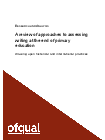Research and analysis: A review of approaches to assessing writing at the end of primary education

The focus of this paper is on large-scale, primarily summative assessments of writing at the end of primary/elementary education.
Documents
A review of approaches to assessing writing at the end of primary education
Ref: Ofqual/19/6492PDF, 935KB, 60 pages
This file may not be suitable for users of assistive technology. Request an accessible format.
If you use assistive technology (such as a screen reader) and need aversion of this document in a more accessible format, please email [email protected].Please tell us what format you need. It will help us if you say what assistive technology you use.
Details
Our research looks at approaches in 15 assessment systems across a number of international jurisdictions, considering the benefits and drawbacks of different approaches. We also review historical approaches to the assessment of writing in England and consider the changes that have taken place since assessments were first introduced in the 1990s.
Assessing writing is a challenging task and we do not claim that a single approach is best. There are a number of complex decisions to be made in the design of any assessment which depend on its purpose and how outcomes will be used. These decisions are often highly context-specific.
Our research also considers innovations in the assessment of writing, including comparative judgement and marking of extended writing by artificial intelligence.
Published 22 March 2019











Responses